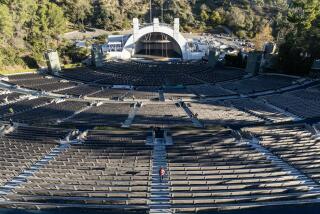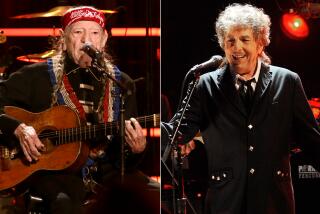Elton John Shines as a Favorite Son of L.A. at Hollywood Bowl
Cities normally adopt athletes as their favorite sons--a young pitcher from Mexico who rolled his eyes toward the heavens before hurling the baseball, or a magical guard from Michigan who could pass the basketball across a court like no one you had ever seen.
When cities have embraced musicians as their own, it has usually been hometown products like Elvis Presley in Memphis or John, Paul, George and Ringo in Liverpool.
Los Angeles, however, has adopted over the years someone who is neither an athlete (unless you count his soccer fantasies) nor even a native, though he has spent enough time here on stage alone to almost qualify for voting rights.
“Good evening, Los Angeles,” Elton John said near the start of his energetic, 2 1/2-hour concert on Friday at the Hollywood Bowl. “Here we are again.”
Again, indeed.
Since his U.S. debut at the Troubadour in West Hollywood a quarter-century ago, the English singer-pianist has sold out virtually every venue of size in the area--from the Santa Monica Civic Auditorium and the Greek Theatre to the Universal Amphitheatre, the Forum and Dodger Stadium. He’s probably headlined the Hollywood Bowl more than anybody who doesn’t have “conductor” in his or her title or Beethoven and Mozart in the set list.
The cheer that John received from the capacity crowd when he walked on stage in a harlequin-patterned suit Friday told you a lot about the special relationship between him and his fans here--not just the volume of the greeting, but the warmth. The audience wasn’t just saluting stardom, but appeared to be acknowledging what has become a virtual family tie.
The connection starts with the music. With lyricist Bernie Taupin, John has written some of the most enduring music of the pop era.
Whether as desperate as the old “Don’t Let the Sun Go Down on Me” (on which George Michael joined John on Friday) or as gently uplifting as “I Guess That’s Why They Call It the Blues,” the sentiments and strains of the songs offer an emotional purity that rings true. It is music that isn’t tied to fad, but which continues year after year to offer comfort and delight.
Though much of the time John’s voice didn’t come through the sound system with its normal concert clarity, he and his six-piece band (again featuring Ray Cooper on percussion and Davey Johnstone on guitar) played with vitality and command.
But the relationship between John and his fans, one senses, goes deeper than music alone.
In an age where most pop artists seem to want to distance themselves from fans, John has opened up to a remarkable degree. He has shared in interviews the private matters of his life, from his sexuality to his addictions, and he has become a leader in AIDS awareness, hosting in Los Angeles both charity tennis matches and annual post-Oscar fund-raising parties.
Despite all that he has given through his music and his charities, John has spoken often over the years about the difficulty he has had in accepting an audience’s affection. Even the millions of album sales and the torrents of applause weren’t enough to always overcome his one-time lack of self-esteem.
So it was touching and revealing Friday when John took time near the end of the evening to thank the audience, a bit shyly, for its loyalty and support all these years.
It was also touching later when John chose to open the encore segment of the evening with “Candle in the Wind,” his ode to Marilyn Monroe--another pop-culture figure who enjoyed a special, if more tragic, relationship with this town. As hundreds of flames from lighters and matches flickered in the night, the venerable old Bowl for a moment seemed to be hosting not just another concert. It felt as if it had been turned over this evening to a giant family reunion.
More to Read
The biggest entertainment stories
Get our big stories about Hollywood, film, television, music, arts, culture and more right in your inbox as soon as they publish.
You may occasionally receive promotional content from the Los Angeles Times.










